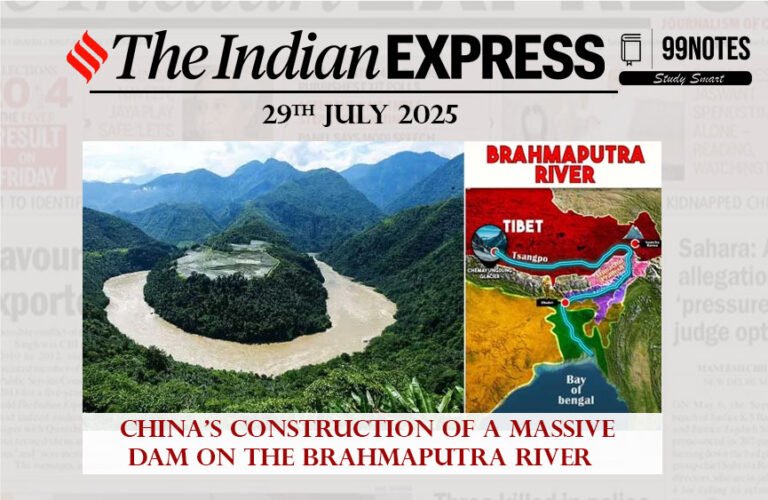18 July 2025 : Daily Current Affairs
1. India warns against ‘double standards’ over Russian oil
Source: Page 1 , The Hindu UPSC IAS Edition
| Topic: GS-2 International Relations, GS3 – Economy (Energy Security) |
| Context |
|
Background
-
The U.S. is considering punitive tariffs on nations trading with Russia, especially in the energy sector, to deter indirect support for Russia’s actions in Ukraine.
-
India, China, and Brazil are among the largest importers of Russian oil post-Ukraine war.
India’s Position
-
Securing affordable energy remains India’s highest priority in the face of global volatility.
-
India has diversified oil imports, now sourcing from around 40 countries.
-
The government cautioned against selective application of trade rules, pointing out potential “double standards” by Western nations.
Implications for India
-
Possible secondary sanctions or tariffs on Indian imports/exports could impact trade and economic stability.
-
Threat of sanctions tests India’s independent foreign policy and diplomatic balancing act between the West and Russia.
-
Energy security and inflation in India are closely tied to access to affordable crude.
Broader Analysis
-
Raises questions about the effectiveness and global legality of secondary sanctions.
-
Highlights the complexity of global energy geopolitics during conflicts.
-
India’s response signals its intent to preserve autonomous decision-making despite external pressure.
Way Forward
-
India should continue to uphold its sovereign energy policies while diplomatically engaging with both the West and Russia to protect its national interests.
-
A multilateral approach to global conflicts and trade restrictions is necessary to ensure legitimacy and fairness.
Practice Question:
|
“India’s purchase of Russian oil in the backdrop of the Ukraine-Russia conflict has come under international scrutiny. Critically analyze how India balances its energy security imperatives and foreign policy autonomy in this context.” (250 words / 15 marks) |
2. Judicial panel blames RCB, KSCA, others for Bengaluru stampede
Source: page 1, The Hindu UPSC IAS Edition
| Topic: GS-2 – Governance, GS4 – Ethics and Accountability |
| Context |
|
Lapses Identified
-
Royal Challengers Sports Pvt. Ltd., event management companies, and Karnataka State Cricket Association held responsible for operational mismanagement.
-
Police officers criticized for ineffective crowd control.
Broader Implications
-
Raises the urgent issue of public safety during mass events and the need for comprehensive planning.
-
Spotlights the accountability of authorities, organizers, and law enforcement.
-
Demonstrates the role of judicial oversight in ensuring justice and institutional learning.
Analysis
-
Event management in India frequently ignores best practices on safety, reflecting governance, ethical, and professional deficits.
-
The need for clear protocols and training for police and private players.
-
Public trust depends on visible accountability and systemic change post-tragedy.
Way Forward
-
Stringent regulatory oversight and regular mock drills for high-attendance events.
-
Mandating accountability mechanisms and prompt legal actions against defaulters.
Practice Question:
|
“Event management failures during mass congregations can have tragic consequences. Analyze the systemic gaps that enable such mishaps and suggest measures to strengthen accountability and safety.“ (250 words / 15 marks) |
3. Delhi to get Central grant of ₹600 crore for development: CM
Source: Page 2, Indian Express Delhi Edition
| Topic: GS-2 – Governance, GS3 – Infrastructure |
| Context |
|
Significance
-
The SASCI scheme funds long-term capital projects for rapid development.
-
Priority areas: traffic management, drainage, green energy, waste management.
Analysis
-
Highlights importance of Center-State fiscal cooperation for urban renewal.
-
Funding infrastructure upgrades is crucial for improving quality of life and economic competitiveness in mega cities.
Challenges
-
Ensuring transparent and efficient use of funds.
-
Overcoming bureaucratic bottlenecks and monitoring project execution for timely completion.
Way Forward
-
Emphasis on robust audit and governance frameworks for public infrastructure spending.
-
Continuous dialogue between Central and State governments for optimized resource utilization.
Practice Question:
|
“Discuss the challenges and strategies for effective utilization of special central assistance to Union Territories in the context of urban development in India.” (150 words / 10 marks) |
4. SC stays HC order in contempt case against Kumaraswamy
Source: Page 5, The Hindu Delhi Edition
| Topic: GS-2 – Polity & Governance, GS2 – Judiciary |
| Context |
|
Legal Issues
-
Contempt proceedings and related eviction notices were initiated despite Kumaraswamy not being an original party to the case.
-
SC termed the situation a “comedy of errors”, emphasizing adherence to due process.
Analysis
-
Ensures principles of natural justice—right to be heard—are safeguarded.
-
Highlights the complexity of land encroachment and the role of different government levels.
Implications
-
Reinforces the need for clear judicial procedures before penal actions.
-
Judicial interventions must avoid procedural overreach, protecting individual rights.
Way Forward
-
Develop transparent, time-bound procedures in handling encroachment and contempt cases.
-
Sensitize lower courts and administrative authorities on due process.
Practice Question:
|
“Examine the importance of ensuring due process in contempt proceedings in India. Illustrate with recent judicial interventions.” (150 words / 10 marks) |
5. Faulty translation of Kannada on Meta platforms distorting facts, says CM Siddaramaiah
Source: Editorial, Page 5, Indian Express Delhi Edition
| Topic: GS-2 – Governance (Language, Technology, Federal Issues) |
| Context |
|
Key Issues
-
Faulty translations distort public communication, lead to misinformation, and can foment tensions.
-
State government sought temporary suspension of the feature until quality can be ensured.
Broader Implications
-
Technology giants must be accountable for content accuracy in regional languages.
-
Digital governance and linguistic inclusion are central to democracy and social harmony.
-
Gaps expose digital divide and need for local expertise in AI/Language Technology.
Way Forward
-
Collaboration between tech firms and linguistic experts to improve AI tools.
-
State and Central IT policies must address data accuracy and local languages.
Practice Question:
|
“Discuss the challenges posed by faulty language translations in technology platforms for governance and public discourse in India. Suggest policy solutions.” (150 words / 10 marks) |
Check more: 17 July 2025 : Daily Current Affairs



